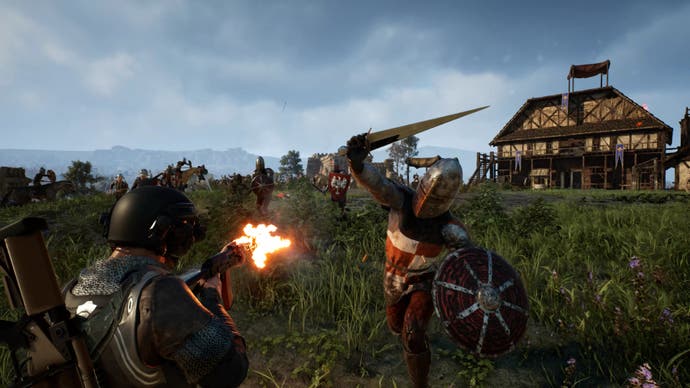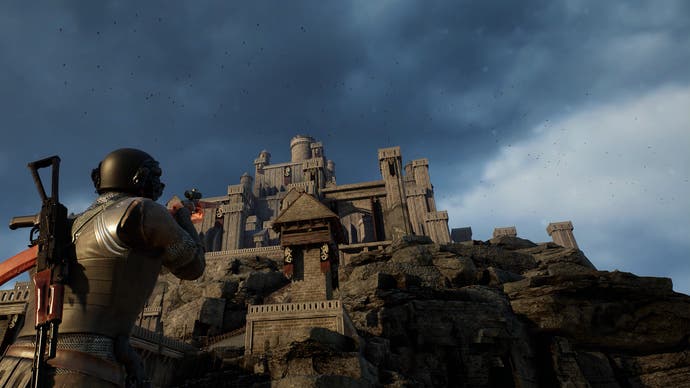Kingmakers is the glorious embodiment of one of gaming's most powerful rules, and I am here for it
Double it.
Hello. One of my favourite pieces of writing about games, not that anybody asked, is from Sid Meier. It's the fourth, I think, of his 10 rules for game design. The first rules have laid out the scene: choose a topic you have passion for, define your axioms, refine your axioms. All good stuff. And then, suddenly:
Double it or cut it in half.
This is what really good film cuts are made for. We have moved from the theoretical to the densely practical. We were at the blackboard, we were pontificating, and now we're right in it, locked in the kitchen, spaghetti sauce everywhere, and we're trying to turn things around before the cooker explodes. Double it. Or cut it in half. This moment calls for big things, not small things. This moment counts.
All of which is to say: Kingmakers, a game whose trailer I saw for the first time earlier this week when it dropped. Total Film, back in the day, used to do this chart of your potential interest while watching a film: a line that rose and fell as time passed, the whole thing often employed as a joke. A good joke. Maybe they still do it! But for real: I would love to see a chart of people's interest while watching the Kingmakers trailer. Is it one of the best trailers of all time? Almost definitely. Is this game instantly propelled into Game of the Year territory? Millions of views and counting. The people have spoken. They have watched and rewatched. They want Kingmakers pyjamas to sleep in at night. They are stripping the walls. They want Kingmakers wallpaper!
And it's so simple. Here we go. Medieval action. Knights. Castles. Masses of soldiers. A little light strategy - placing towers and walls? All fine. But we're building to something. A dragon? No. Dragons are nothing compared to this. That roaring on the soundtrack. Here comes a pickup truck. I know right. A pickup truck riding through the middle of Henry V Part One or whatever.
Cue much collective losing of it. Cue a sudden burst of oxytocin or whatever it is as we all fall in love at once. It's medieval knights on one side, but on the other side is a guy with a rattly old Mazda Barracuda (precise model might have been plucked from the air by me). And he's getting out of the Mazda. And he has a shotgun. A sniper rifle. A grenade launcher. He has an attack helicopter.
Many thoughts here, but let's try to untangle them. Yes, why hasn't someone done this before. I know. But that's what you always think when you witness genius. Yes, there's a lot in play alongside the pickup and the modern weapons: there's base-building, troop management and all that jazz. But there's also that delirious Katamari power-curve at work, keeping everything honest. Carnage that starts pickup-sized and just gets bigger and bigger, driven by the gleeful power of anachronism.
But there's more. There is at the heart of this a beautiful deployment of Meier's forth rule. Someone has been here and they have thoroughly doubled it. And doubling it isn't just about adding zeroes to the end of the score (though this too is deeply rad - it's part of why Peggle is so satisfying). It's not about chopping out the first 10 slots on the skill tree and starting with "exploding teleport" rather than "modest cough." It's about stepping back, seeing an entire game, and thinking about what the biggest, boldest, most hilarious thing you could do RIGHT NOW would be. And then thinking where that would take you and whether you can handle it.

I have a lot more thoughts, but I'm sure they're obvious. Over the last decade or so, alongside the bigger, fewer bets publishers have made - which has also often led to formula, to conservatism - an onward march in graphical fidelity means that a certain kind of game has become obsessed with the details. I love details, and I love that games do this. The fold of a cloth, that bluing of the horizon to represent distance that Leonardo was the first to discover, realistic flames, Baghdad's ancient wonders restored to us, the way a set-piece can unfold like a movie if a player can be coaxed into hitting their marks. All of this stuff is deeply wonderful, but as a trend it can sometimes lead people to think that blockbusters are things that are made to be admired more than anything else. And it's nice to have someone drive a Mazda Barracuda, or whatever it is, right through that idea now and again. Don't admire this game. Thrill to it. Lose yourself in it. Break it and laugh wildly as it responds to what you've just done.
Oh, I could end here by talking about Palworld and Helldivers 2, and a trend that stuff like Kingmakers possibly belongs to of scrappy communal fun and how double-A is staging a welcome comeback. But instead, let's think one last time about Sid Meier, the man who made those rules.
Sid Meier's made games about Romans and about spies and trains, but he's also made games about Bach. He's someone worth listening to. And listen to the other part of that fourth rule, which I left out up top in the sneaky service of narrative shape. "Double it or cut it in half," it goes. "You are more wrong than you think."
More wrong than you think. That sounds like criticism. But listen closely: it's actually an invitation. An opportunity. It's a portal, and through that portal you can already hear the revving of a pickup truck engine.


